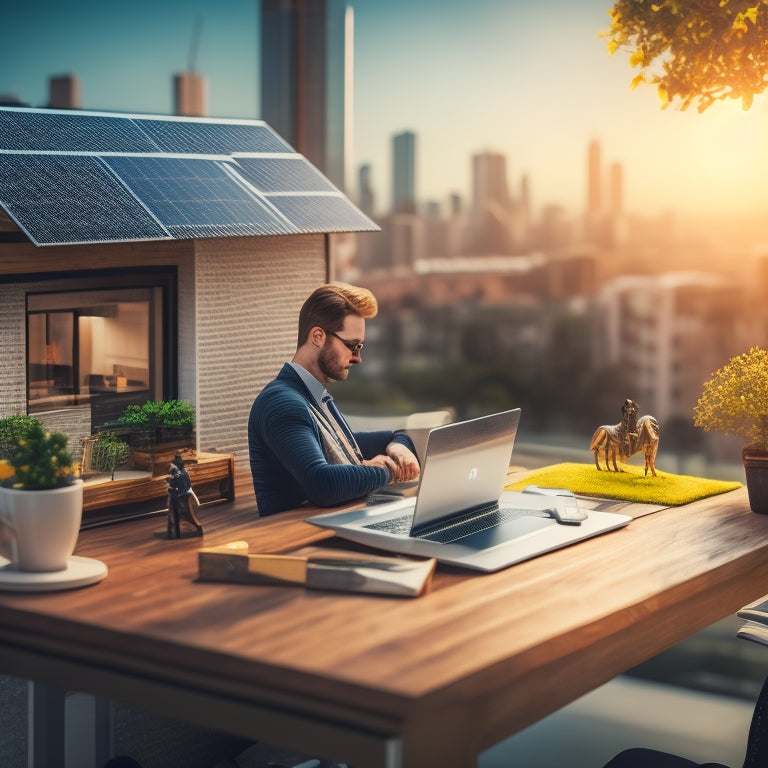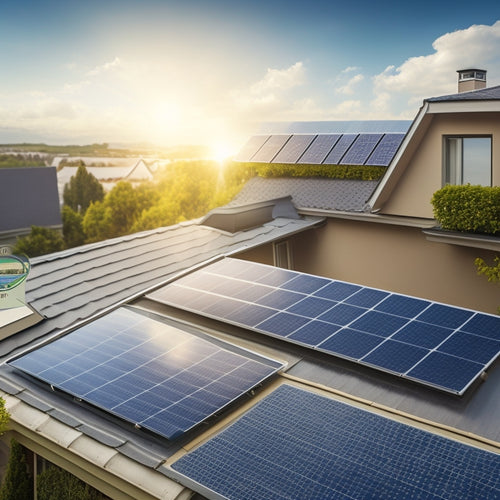
Buy Home Solar Panels Online: A Step-by-Step Guide
Share
You're about to invest in solar energy, and buying the right solar panels online is essential. First, choose the appropriate solar panel type, taking into account factors like efficiency and warranties. Then, evaluate your energy needs by assessing your daily consumption and identifying areas of wastage. Select a suitable inverter, and determine the number of panels you need based on your energy requirements and roof constraints. You'll also need to take into account system components, installation, and post-purchase support options. By following these steps, you'll be well on your way to harnessing renewable energy. Now, let's delve deeper into the specifics to ensure a smooth shift to solar power.
Key Takeaways
• Evaluate PV cell types, warranties, durability, and efficiency to choose the right solar panels for your home.
• Assess your energy needs by evaluating daily consumption, past utility bills, and conducting an energy audit.
• Select a high-efficiency inverter that supports DC optimization and complies with grid connection standards.
• Consider the entire solar panel system, including mounting systems, charge controllers, and energy storage components.
• Monitor your solar panel system's performance in real-time to ensure optimal energy production and consumption.
Choosing the Right Solar Panel
When selecting a solar panel, you need to take into account the type of photovoltaic (PV) cells, as monocrystalline, polycrystalline, and thin-film cells each have distinct advantages and disadvantages that impact their performance and cost. Monocrystalline cells offer high efficiency but are more expensive, while polycrystalline cells provide a balance between performance and cost. Thin-film cells, on the other hand, are more affordable but less efficient.
Beyond PV cell type, you should also consider the solar panel's warranty and durability. Look for panels with extensive warranties that cover performance, materials, and workmanship for at least 25 years. Additionally, check if the panel has undergone rigorous durability testing, such as those specified by the International Electrotechnical Commission (IEC). This ensures the panel can withstand various environmental conditions and last for its expected lifespan.
Assessing Your Energy Needs
Now that you've selected the right solar panel, you'll need to evaluate your energy needs to determine how many panels you'll require to power your home efficiently. To do this, you'll need to calculate your average daily energy consumption in kilowatt-hours (kWh).
You can do this by reviewing your past Utility Bills to identify your highest and lowest energy usage periods.
Next, consider conducting an Energy Audit to identify areas in your home where energy is being wasted. This will help you pinpoint opportunities to reduce your energy consumption and optimize your solar panel system.
Be sure to account for any energy-intensive appliances or systems in your home, such as electric water heaters or HVAC systems.
Understanding System Components
Your solar panel system comprises several essential components that work together to harness and convert sunlight into usable electricity, and understanding their roles is vital for peak system performance.
As you design your system, you'll need to take into account the type and quality of each component to guarantee efficient energy production.
The solar panels themselves are the most visible component, converting sunlight into DC power. A mounting system securely fastens the panels to your roof, ensuring a watertight seal and allowing for easy maintenance.
A charge controller regulates the flow of energy to your battery bank, preventing overcharging and ensuring a long battery lifespan. Energy Storage is a critical aspect of your system design, as it allows you to store excess energy generated during the day for use at night or during power outages.
A monitoring system tracks your energy production and consumption, providing valuable insights to optimize your system's performance. By understanding the role of each component, you can design a system that meets your unique energy needs and maximizes your return on investment.
Selecting the Ideal Inverter
For a smooth integration of your solar panel system with the electrical grid, you'll need to select an inverter that efficiently converts the DC power generated by your solar panels into AC power, suitable for feeding into the grid or powering your home's electrical appliances.
When selecting an inverter, consider the following key factors:
-
Inverter Efficiency: Look for an inverter with a high efficiency rating (>95%) to minimize energy losses and maximize your system's overall performance.
-
DC Optimization: Make sure the inverter supports DC optimization, which enables each panel to operate independently, maximizing energy production even when some panels are shaded or underperforming.
-
Grid Compliance: Verify the inverter meets grid compliance standards, guaranteeing a safe and reliable connection to the electrical grid.
Sizing Your Solar Panel System
Now that you've selected the correct inverter, it's time to determine the best size of your solar panel system.
To do this, you'll need to assess your energy needs by calculating your daily energy usage in watt-hours. By doing so, you'll be able to calculate the required quantity of panels and guarantee your system meets your energy demands.
Assessing Energy Needs
To accurately size your solar panel system, you must first determine how much energy your home consumes, which is a critical step in ensuring that your system will meet your energy needs. This process is often referred to as an energy audit, and it involves analyzing your energy consumption patterns to determine your overall energy requirements.
To conduct an effective energy audit, you'll need to gather some essential information about your energy usage. Here are three key things to take into account:
-
Peak energy usage: Identify the times of day when your energy consumption is highest, typically during morning and evening hours when lights, appliances, and HVAC systems are in use.
-
Energy-intensive appliances: Take note of the energy-hungry appliances in your home, such as refrigerators, air conditioners, and electric water heaters, which can have a significant impact on your overall energy consumption.
-
Seasonal variations: Consider how your energy usage changes throughout the year, as seasonal fluctuations in temperature and daylight hours can impact your energy needs.
Calculating Panel Quantity
With your energy needs assessment in hand, you're ready to calculate the number of solar panels required to meet those needs, a process that involves determining the size of your solar panel system. This calculation is essential to make sure you're generating enough electricity to power your home efficiently.
To start, you'll need to take into account your roof constraints, such as available space, orientation, and shading. These factors will impact the number of panels you can install and their best placement.
Next, you'll need to determine your system's capacity, measured in watts (W). A typical residential solar panel system ranges from 3,000 to 10,000 W. To calculate your system size, divide your total daily energy needs (determined in the previous step) by the peak sun hours in your area. This will give you the minimum system size required to meet your energy needs.
Take energy efficiency into account when selecting your solar panels, as more efficient panels can generate more power per unit area. By accurately calculating your panel quantity, you'll be able to maximize your energy output while minimizing your environmental footprint.
Finding the Best Installation
You'll want to research and evaluate local solar panel installation companies to find the best fit for your specific needs and budget. This step is important in guaranteeing a seamless and successful installation process.
When searching for an installation company, consider the following factors:
-
Experience with local regulations: Make sure the company is familiar with your area's permit process and local regulations, ensuring a smooth installation experience.
-
Certifications and credentials: Look for companies with certifications from reputable organizations, such as the North American Board of Certified Energy Practitioners (NABCEP).
-
Customer reviews and testimonials: Research online reviews and ask for referrals to get a sense of the company's reputation and customer satisfaction.
Monitoring and Maintenance Tips
Your newly installed solar panel system requires regular monitoring and maintenance to guarantee peak performance and longevity, and it's your responsibility to stay on top of it. Regular checks will help you identify potential issues before they escalate, ensuring your system operates at its best levels.
Start by monitoring your system's performance using data analytics tools, which provide real-time insights into energy production, consumption, and savings. This data will help you pinpoint areas for improvement, enabling you to optimize your system's performance. For instance, you can adjust the angle of your panels or clean them regularly to maximize energy output.
Additionally, perform routine visual inspections to detect any signs of wear and tear, corrosion, or pest infestations. By staying proactive, you'll be able to identify and address potential issues before they impact your system's performance.
Post-Purchase Support Options
After the initial installation, having a dependable support system in place is essential to address any questions, concerns, or technical issues that may arise during the lifespan of your solar panel system. You'll want to make sure that you have access to thorough post-purchase support options to maximize the performance and longevity of your system.
When evaluating solar panel providers, look for the following support options:
-
Warranty Extensions: Check if the provider offers extended warranty options beyond the standard warranty period, providing you with added peace of mind and protection against unexpected repairs.
-
Technical Assistance: Make certain that the provider offers 24/7 technical support, including online resources, phone support, and on-site assistance, to address any technical issues that may arise.
-
Regular System Check-Ups: Look for providers that offer regular system check-ups and maintenance services to ensure your system is operating at its best.
Frequently Asked Questions
Can I Install Solar Panels on My Rented Property?
"You're stuck in the Renter's Dilemma, wanting to harness solar power but needing your landlord's consent. Don't let uncertainty hold you back - you can install solar panels on your rented property, but only with your landlord's permission, in writing, to avoid any future disputes."
How Long Does It Take to Break Even on Solar Panel Investment?
You'll break even on your solar panel investment in 5-7 years, depending on your energy usage and local incentives, with solar savings accumulating over an energy timeline that typically spans 20-30 years.
Are Solar Panels Affected by Shade From Trees or Buildings?
"Can you really afford to let shade hold you back from harnessing the sun's power? You'll suffer energy loss if you don't conduct a thorough Shade Analysis to identify areas affected by trees or buildings, optimizing your solar panel placement for maximum energy output."
Can I Use Solar Panels to Charge My Electric Vehicle?
You can use solar panels to charge your electric vehicle, leveraging EV charging stations integrated with your solar infrastructure, allowing you to power your ride sustainably and reduce your carbon footprint to a great extent.
Do Solar Panels Work During Power Outages?
"As you navigate the dark landscape of a power outage, a beacon of hope emerges: your solar panels, steadfast like a lighthouse, providing Grid Resilience and Emergency Preparedness, ensuring you're not left in the dark, even when the grid fails."
Related Posts
-

Why Portable Solar Panels Are a Car Owner's Best Friend
As a car owner, you're likely no stranger to the frustration of a dead battery or a dwindling power supply on a long ...
-

Charging On-The-Go: Portable Battery Solutions Online
You're always on the move, and your devices need to keep up - that's why having a reliable portable battery solution ...
-

Understanding Residential Solar Panel Installation Warranties
When you invest in a residential solar panel installation, you expect a comprehensive warranty package that covers th...


